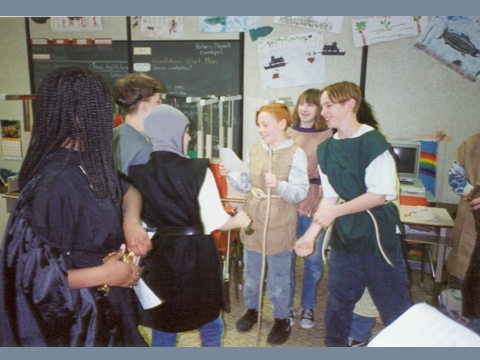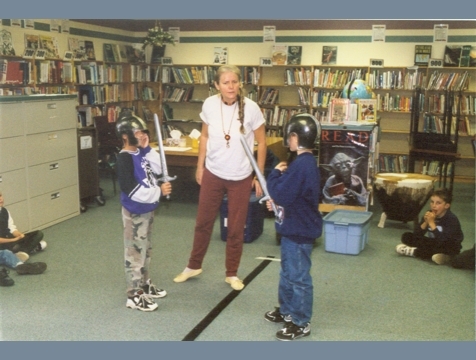- Robin Hood
A TIMELESS TALE: ROBIN HOOD AND THE CORPORATE BARONS
Created and presented to hundreds of students by Lesley Walker-Fitzpatrick
Made possible by The Global Community Center
A Dramatic Workshop on World Food Issues
 This student participatory workshop is based on popular theatre methods ‘educational drama for social change’ and involves the whole class in exploring causes of world hunger and other global food issues. Each student is given a character sketch with name, social status, description and key attitudes as well as a costume ‘in a bag’ and a scene location at the beginning of the drama.
This student participatory workshop is based on popular theatre methods ‘educational drama for social change’ and involves the whole class in exploring causes of world hunger and other global food issues. Each student is given a character sketch with name, social status, description and key attitudes as well as a costume ‘in a bag’ and a scene location at the beginning of the drama.
The first act takes place in medieval England and is based on the Robin Hood legend. The narrator plays the spirit of Maid Marian who sets the scene, initiates the action and keeps the plot moving. The students create their own dialogue.
The students realize that hunger in medieval England was due to greed and poor food distribution not because there wasn’t enough food.
 The students watch a video that gives them an overview of hunger in the world today and some of the current food myths. The second act, set in modern times, parallels the first act. Each student is given a new character; students who play a rich character in the first act play a poor one in the second act.
The students watch a video that gives them an overview of hunger in the world today and some of the current food myths. The second act, set in modern times, parallels the first act. Each student is given a new character; students who play a rich character in the first act play a poor one in the second act.
The plot in each act begins with the wealthy power brokers sitting at a sumptuous meal discussing how to increase their wealth. The plans flow down the chain of command ending with devastating effects on the lives of the peasants/farmers.
Prince John demands more taxes to strengthen his army and the guards are ordered to bleed more wealth from the peasants.
The owner of a multinational corporation discusses how to increase profits from cash crops resulting in small family farmers, who have been living in a system of self-sufficiency, being forced off their land by corporate interests, millionaire land owners and modern agribusiness methods.
Robin Hood and his Band of Merry Men ambush the Sheriff of Nottingham stealing from the rich to give to the poor.
The answer is not so simple in the modern act and so each class is challenged to create an ending in the modern scene.
 “The modern scenario was very rewarding. We had a brooding priest who agonized over his inability to effect a humane solution to the situation. We had a farmer who would absolutely never leave his farm. He was willing to die – there it was in the set of his jaw and the fire in his eyes. And this was from a boy so painfully shy that he had barely spoken a dozen sentences to me thus far in the semester. I was mesmerized at one point by the controlled physical intensity of a guard (who was much better known for exasperatingly high spirits) and the haughty chilliness of the millionaire landowner whom he served. In the end there were attempts at both political and social solutions. Lawyers and farmers found how to work together; other farmers succumbed to their fears of poverty and starvation, giving in to corporate pressure…And in the end the students emerged at another level of questions and problems and started to see some of the complexity of this reality. It stayed with them for many months. The intense guard even decided, against all probability, to continue with drama.”
“The modern scenario was very rewarding. We had a brooding priest who agonized over his inability to effect a humane solution to the situation. We had a farmer who would absolutely never leave his farm. He was willing to die – there it was in the set of his jaw and the fire in his eyes. And this was from a boy so painfully shy that he had barely spoken a dozen sentences to me thus far in the semester. I was mesmerized at one point by the controlled physical intensity of a guard (who was much better known for exasperatingly high spirits) and the haughty chilliness of the millionaire landowner whom he served. In the end there were attempts at both political and social solutions. Lawyers and farmers found how to work together; other farmers succumbed to their fears of poverty and starvation, giving in to corporate pressure…And in the end the students emerged at another level of questions and problems and started to see some of the complexity of this reality. It stayed with them for many months. The intense guard even decided, against all probability, to continue with drama.”
- Nancy Stotts-Jones Teacher
The students in their characters, create dialogue, make decisions, live in a different time or country. A very complex global issue starts to unfold before them. They also learn that everyone is capable of playing a role.
The students feel what it is like to be kicked off their land with few options to care for their families. I have never had a class willing to just accept the unfairness of farmers being kicked off their land. One memory that stands out is the young Canadian student who was moved to tears by conditions of hunger being comforted by a young student recently arrived from El Salvador.
The main goal of the workshop is to dispel some of the most common myths about hunger. The reality is we have devastating hunger in the midst of bountiful plenty and the danger of the unregulated biofuel industry and unlabeled genetically altered food.
The dramatic solutions in the modern act have been varied, creative and reflective of reality. The workshop has been given in over 60 classes to almost 2,000 students.



